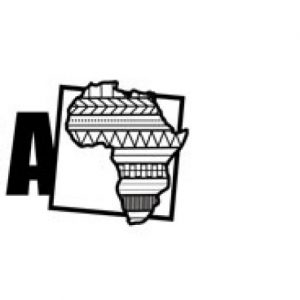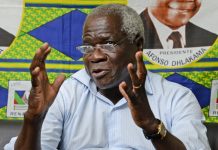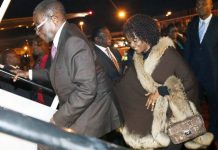Harare - In power since 1980, President Robert has been nominated to represent the ruling Zanu-PF in 2018 elections despite failing health and old age. At 93, Mugabe is the world’s oldest President.
Opposition parties in Zimbabwe accuse Mugabe’s Party of employing various election rigging tactics since 1980 such as unleashing paramilitary youths to terrorise the electorate.
In 2008, the main opposition leader, Morgan Tsvangirai was forced to quit a run-off presidential poll against Mugabe citing violence against his supporters. Over 200 opposition supporters were killed, and several thousands were left nursing injuries or displaced.
In 2013, Mugabe’s Zanu-PF was accused of engaging an Israel firm to rig elections on its behalf. As the 2018 beckons, already the MDC has raised fears the ruling party has begun its rigging tricks. Tsvangirai has gone further to say he will not accept any result that will not declare him a winner.
In this series, Tapiwa Mashakada, a former Minister of Economic Planning and Investment the unity government between the Zanu-PF and the opposition sheds light on election rigging in Zimbabwe.
AllnetAfrica.com will cover four of the 14 tactics the ruling parties allegedly uses to manipulate elections. For updates follow like us here on Facebook.
THE RIGGING NARRATIVE IN ZIMBABWE
(Dr Tapiwa Mashakada is a former Minister of Economic Planning and Investment Promotion)
Abuse of State Resources
Between 1980 and 2000, the government generally served all its citizens. But after 2000, the government turned itself into a party-state feature where state resources were now going to be devoted towards patronage programs that create a captive voter base for the ruling party.
State resources were used to build social bases for Zanu-PF to keep vowed fans of that party so that, to them fighting to keep the party in power has almost become like a fatwa. These partisan programs are disguised as empowerment vehicles or national programs in order to make it lawful to use treasury resources, the Presidential input scheme being an example.
Opposition Movement for Democratic Change supporters are not allowed to get any of these inputs. In rural areas, the Department of Social Welfare is discriminating food distribution, denying opposition or suspected opposition supporters much needed food aid in the face of hunger induced droughts. There are so many other government programs that are rolled out but whose purpose is for oiling political patronage. State resources therefore have given Zanu-PF a boon. This tilts the electoral field in its favour. Abuse of state resources is one sure rigging vehicle.
Access to the Media
The media is often referred to as the Fourth estate, coming after the other 3 pillars of State namely the Executive, Parliament and Judiciary. Before the advent of social media, media access for the opposition was too bad. In terms of penetration, the most pervasive media is the radio and television. The opposition has had a tough time calling for media reforms. State broadcaster, the Zimbabwe Broadcasting Cooperation (ZBC) and radio was dominated by Zanu-PF. In regard to public media the situation has not changed.
However in recent years this monopoly was challenged by private radio stations VoP and Studio 7 which broadcast off shore. There is also Social Media which has improved the communication subject to the affordability of compatible gadgets for things like Facebook, tweeter, internet and Whatsapp platforms. These are however still restricted in rural areas due to gadget affordability issues. So there is still a problem. What I am saying is let private media and social media be options available after reforming access to public media, which by its very nature is funded by the taxpayer. Equal access is key. But there is the Access to Information and Protection of Privacy Act (AIPPA) legislation which further complicates matters. The legislation, enacted in 2002, has no place whatsoever in a democracy, as it stifles civil liberties and people’s freedom of expression quite contrary to principles of constitutional democracy. . Therefore Media reforms are just as necessary on the reform agenda. The 2018 elections will be won in the cyberspace. What happened during the American elections and the role of the media is instructive.
Zimbabwe Electoral Commission
Election management in Zimbabwe is done by the Zimbabwe Electoral Commission which is perceived to be partisan. At one time, the ZEC chairman was appointed as non-constituency Member of Parliament (MP) allegedly on a Zanu PF ticket. It is also alleged that senior ZEC staff are deployed by the secret service. It is also alleged that ZEC reports to Zanu PF. People have no confidence in ZEC. They fear that a Chinese firm will be awarded the Biometric Voter Registration (BVR) machines tender by ZEC. It is also feared that voter registration will favour Zanu-PF in rural areas, and that registration will be a bottleneck in urban areas. The issue of national identity cards and residential addresses is going to be a likely source of conflict. How many times has the National Election Reform Agenda (Nera), a coalition of opposition parties demonstrated against ZEC?
Can the current ZEC accept political reforms or just voters roll reforms? Can ZEC disqualify a violent Zanu PF candidate? Can the BVR software be manipulated? There are a lot questions when it comes to ZEC. For example, can ZEC announce results before consulting the President? Can ZEC declare Tsvangirai or any opposition President the winner?
Voter Registration
One other way that Zanu-PF rigs elections is through voter registration. This process is manipulated in such a manner that in urban areas voter registration is done at baby-step pace whereas in rural areas, it’s a floodgate. Even the issuance of national identity cards is a painstaking process in the urban centres. All this is well calculated to tilt the scales in favour of Zanu- PF.
The BVR system will not change this rigging behaviour of Zanu-PF. In fact there is a big cache in the BVR no wonder why Zanu-PF is so happy about it. I think they know how to rig elections using this new system and the fact that they are likely to give the tender to a Chinese company. Any software can be manipulated. If we see that the BVR is a booby trap there is nothing to stop us from backtracking. We reserve all our options. Voter registration must be transparent and done by an audit firm not ZEC.
More in the next article …






